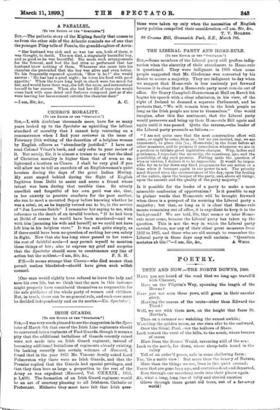CICERO ' S MORALITY.
[To TER EDITOR OP THZ "8PTCTATOR."] with doubtless thousands more, have for so many years looked up to the Spectator as upholding the loftiest standard of morality that I cannot help venturing on a remonstrance when I find your reviewer in the issue of February 25th writing of the desertion of a helpless woman by English officers as "abundantly justified." I have not read Colonel Vibares book, and only refer to your review of it. But surely, Sir, it is almost a truism to say that the ideal of Christian morality is higher than that of even so en- lightened a heathen as Cicero. I shall be very glad if you will allow me to tell an anecdote of an Englishwoman's quiet heroism during the days of the great Indian Mutiny. My aunt stayed behind during the flight of English fugitives from Delhi to assist and nurse a friend whose infant was born during that terrible time. So utterly unselfish and forgetful of her own peril was she, that, in her anxiety to procure comforts for the poor mother, she ran to meet a mounted Sepoy before knowing whether he was a rebel, or, as he happily turned out to be, in the service of "Jan Larrens Sahib." I remember her saying to me, with reference to the death of an invalid brother, "If he had been at Delhi of course he would have been murdered—and we with him [meaning his wife and herself] as we could not have left him in his helpless state." It was said quite simply, as if there could have been no question of seeking her own safety in flight. Now that she has long since passed to her rest— the rest of faithful souls—I may permit myself to mention these things of her ; also to express my grief and surprise that the Spectator should seem to countenance any line of action but the noblest.—I am, Sir, &c., F. S. H. P.S.—It seems strange that Cicero—who died sooner than permit useless bloodshed—should have given such selfish counsel.
[One man would rightly have refused to leave the lady and save his own life, but we think that the men in this instance might properly have considered themselves as responsible for the safe guidance of the whole party of women and children. But, in truth, there can be no general rule, and each case must be decided independently and on its merits.—En. Spectator.]






































 Previous page
Previous page